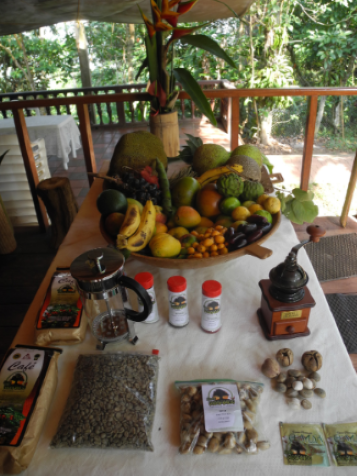

By Dr. Carmen Lacambra-Segura
Biologist
Grupo Laera

By Juan Jose Lacambra Segura
CEO
Grupo Laera

By Dominic Molloy
Head of International Support Strategy
UK Cabinet Office
The Coffee Sector in Colombia
Overview
Historically, coffee has been one of the most important crops in Colombia, representing a significant staple of the country’s diet and economy. Coffee is also among the country’s most exported products. In 2018, the value of annual coffee exports reached USD 2.6 billion, with the main export destinations being the United States (42%), Europe (32%) and Japan (11%). Coffee plays a significant role in generating employment, as more than 785,000 people are directly involved in the sector, representing 26% of the total employment in agriculture.
Coffee production is vulnerable to climate variability, as deviations from normal environmental conditions have demonstrable impacts on production, both in scale and quality. To reduce the climate vulnerability of coffee producers, crop adaptation and management practices that promote resilient production, improve yields and financial returns, are needed. As the profitability of the sector is directly linked with production success, the entire value chain is vulnerable to climate variability.
In addition to climate-related vulnerability, high production costs, including labour and production inputs, are a significant challenge in the sector. Moreover, coffee prices are highly volatile, directly complicating the predictability of revenues and profitability. Another key challenge is access to finance, as there is limited participation by private banks in the supply of credit to coffee producers. In addition, producers often do not comply with standard credit criteria. On top of this, public financing sources, such as producer associations and sector-specific technical assistance providers, offer financing and credits based largely on institutional factors rather than on risk analysis. Consequently, the combined private and public supply is not sufficient to fully cover the financial needs of the sector.
A growing trend in the sector is driven by the increasing popularity of specialty coffees. Specialty coffees, often certified and organic, provide value-add to producers, as products are sold under proprietary brands and at higher prices to customers looking for products that differ from most retail brands. Higher margins allow specialty coffee producers to maintain product quality and quantity, despite climate variability, and to invest in climate-resilient practices.
We are second generation coffee growers, my parents ́ hard work in the farm sent us to the university and now we are back. It is hard to change the old ways, but we know that a productive coffee farm, these days, is more profitable if more post-harvest activities are done within the farm. We have also diversified our income and tourists can come and visit our farm”
Driana Acevedo Café de la Cima – Coffee producer and coffee tourism services
Sector Facts (2018)

- Total production: 13.5 million bags (60kg per bag)
- Total area of production: 877,000 hectares, consisting of ~4,900 million trees planted.
- Type of production: over 563,000 coffee growers, of which 96% are family-owned farms with plantations of less than 5 hectares.
- Average yield: 18.8 bags per hectare
- Sector association level: The National Coffee Federation (FNC) is the country’s main coffee sector association, representing the largest number of coffee growers. FNC supports coffee growers in different areas such as research, technical assistance and capacity building through programs that benefit coffee growers, their communities and the environment. An estimated 96% of small-scale farmers sell their production to FNC, and purchase guarantees provided by FNC bring financial stability to family-owned coffee growers. Other key sector stakeholders: National Coffee Research Centre (Cenicafe) and Agricultural Sector Financing Fund (FINAGRO).
The Coffee Value Chain
Overview

The coffee value chain builds on five main processes from input selection to transportation and distribution. Each process involves specific activities, which are conducted by direct actors and engage identified indirect actors. Climate will influence all process-related decisions, from when to plant to when to collect, and the time-frame for these decisions. There are several value chains for the coffee sector depending on the size of the farm, what processes occur in the farm and customer preferences, among other variables. The diagram is showing only the most relevant processes, each of which involves a series of activities that are influenced by climate.
Normal Environmental Conditions for Production
- Ideal production conditions are at altitudes between 1,200 and 1,800 meters above sea level, with temperatures ranging between 17° and 23°C. However, it is possible to produce quality coffee at marginally higher altitudes and with other precipitation regimes.
- Production levels and crop success depend critically on weather conditions in the flowering stage, notably temperature levels, rainfall patterns, water surplus/deficit, and solar radiation.
- There are different harvest seasons depending on the rainfall regime of specific crop areas. In areas with two rainy seasons, there is a main harvest followed by a mid-crop of lower production. Areas with one rainy season have only one harvest per year. Harvesting is conducted under dry conditions between rainy seasons.
Changes in Weather That Could Affect Production
- The main impacts of climate variability on coffee production include growth limitations, lower bean quality, pests and disease, flowering delays, and harvest failure. The severity of impacts depends on their timing in relation to the phenological stage of the crop.
- Higher temperatures and lower rainfall negatively impact the density of coffee grains and promote the development of disease.
- Surplus rainfall combined with lower solar brightness and reduced temperature adversely affect the production by decreasing the number of flower buds and reducing growth rates. Due to water excess , soils become more acidic, reducing their ability to retain nutrients.
- Surplus rainfall prolongs the drying process and increases quality risks. • Soil erosion has been highlighted as a risk in most coffee areas.
- An estimated 30% of coffee production areas consist of varieties that are exposed to rust.
- Both El Niño and La Niña events have significant impacts on the sector. During La Niña events, rainfall can increase by 20-40%, coupled with a decrease in solar brightness and temperature. During El Niño events, there is an increase in water deficit during dry seasons, affecting the development of the coffee fruit and affecting production negatively.
Main Climate-Related Impacts Affecting the Value Chain
- Post-harvest processes, including storage and transportation to collection centres, are affected by environmental conditions. Particularly, excess humidity affects product quality in these processes.
- Product transportation routes are vulnerable to landslides and climate-related disruptions on rural roads, often increasing the cost of getting products to markets.
B*Resilient Process Model

Each process of the value chain was assessed in order to identify the climate risks associated with each phase and the resilience options and tools available to address these risks and achieve specific resilience outcomes. The BRPM analysis of Site preparation , Crop management and Post-harvest management in the coffee value chain is presented above.

“About 6 years ago, our production was severely affected because the rains came earlier, and plants’ flowering did not coincide with the adequate dry and sunny days required for the development of beans. It was nothing extreme, we just did not have enough dry days. It really affected our household economy, we struggled for a couple of years and the solutions offered to us were not adequate for our farms or our economy. We are one of the poorest municipalities of Colombia”
Pedro Murcia, coffee grower
Resilience Solutions
Crop Management

Knowledge services are key in supporting the growing trend of larger coffee growers moving towards specialized, organic and certified coffee production. It is estimated that potential customers of specialized knowledge services would amount to over 50% of total growers, assuming that larger producers are in the financial position to pay for these services and that small producers receive some of them through the FNC. The increasing popularity of specialised coffee varieties, including organic and certified coffee, are driving market demand and opportunities for the identified resilience solution.
Resilience contribution: Good practices in crop management, provided by knowledge service experts, contribute to climate adaptation by enhancing capacity at the farm level and across the value chain, including agricultural institutions.
Water Management Infrastructure

Appropriate water management is key for the sustainability of the coffee sector. At the farm level, water management infrastructure includes irrigation systems, storage facilities for preservation of water sources, water extraction, transportation, distribution and adequate management of water. Water management is identified as a key resilience solution, particularly in areas prone to droughts. Irrigation and water infra – structure technologies during crop management and post-harvest processes are facilitating reduced costs and increased productivity. Water management infrastructure enables the efficient use of water, energy and labour resources in coffee processes at the farms, allowing improved resource management and product quality. In the context of the coffee value chain, adequate water management is critical during post-harvesting processes.
Resilience contribution: Water management infrastructure contributes to climate adaptation by securing water availability and regularity during relevant processes in the coffee value chain. Distribution and access to fresh water are expected to be critical issues in the medium and long term, as the effects of climate change on water flows are exacerbated by deforestation, changes in land use and alterations affecting the natural drainage of rivers and streams. In particular, regions experiencing seasonal scarcity and affected by El Niño events, will see the positive impacts of efficient water management.
Example of Resilience Solution – Ecomill

The Ecomill equipment, which is used to de-pulp, ferment and wash the coffee bean, improves the efficiency of water and energy use in the processing stage of coffee production.
Bean quality greatly influences coffee prices. Ecomill contributes to high-quality coffee by reducing water use and the contamination generated by discharges during washing and, consequently, protects the quality of the coffee bean.
The Ecomill technology has been developed by the National Coffee Research Centre (Cenicafe) and the machinery is produced and sold to coffee producers by local companies. The efficiency of the Ecomill in reducing water consumption is higher than alternative technologies, such as tank washing with manual agitation.
Target consumers of the Ecomill are most coffee producers of all sizes. While the standard machines are appropriate for large producers, retailed adjustments can be made for small- and medium-size producers. New more affordable versions of the Ecomill are also being developed for small producers. One of the main challenges related to this resilience solution, is the financial constraints of small-scale farmers and limited access to credit. As the Ecomill is physical equipment, it can be insured and, therefore, bought using traditional financial products.
Ecomill allows for a more efficient post-harvest management of coffee production, leading to a more resilient and sustainable value chain. The resilience contribution is particularly significant in production areas that are prone to droughts and water scarcity.
The Ecomill contributes to producing coffee in a sustainable manner and significantly reducing the ecological footprint of the coffee process.
Climate Resilient Business

Café Mogambo is a 20-hectare farm producing single-origin coffee in Viota, Cundinamarca, three hours from Bogota. Mogambo’s coffee production is 100% organic. Mogambo is a multi-strata productive farm, and a botanical garden of 2,000+ species. It is a destination for research tourism, a living laboratory of ethnobotany, biodiversity and coffee. Mogambo has partnerships with high-end restaurants, laboratories and universities in Colombia.
Although Mogambo is not promoted as a climate resilient coffee farm, by implementing good practices and on-site research, production and product quality have remained stable, despite climatic variability. In practice, crop arrangement in a biodiverse polyculture and the use of organic fertilizers have ensured the protection of soil, water, air, and local fauna. The highly diverse canopy allows the natural regulation of temperature, and as soils are not affected by erosion or landslides, crops and production are resilient during drought and heavy rainfall. Moreover, Mogambo’s coffee crops have not been affected by extreme weather (e.g. heat and frost) or El Niño and La Niña conditions.
While monoculture could increase annual production levels by an estimated 15%, the quality of coffee would be directly affected, leading to a deterioration in the competitive advantage of Mogambo coffee in relation to other products in the market.

“We are forestry engineers and used to provide technical assistance to the agriculture sector on behalf of national and international organizations… Not all coffee growers (and farmers) want to put the effort to manage sustainable farms where productivity is high based on good practices. It is easier to sell products of lower quality, with pesticides, or even transform farms into recreation houses, than to put in all the time and effort to create what we have created.”
Leonor Rodriguez, Mogambo Biodiversity Coffee
Originally published by Grupo Laera, Nordic Development Fund, and Inter-American Development Bank under the terms of a Creative Commons Attribution-NonCommercial-NoDerivs 3.0 IGO license.







